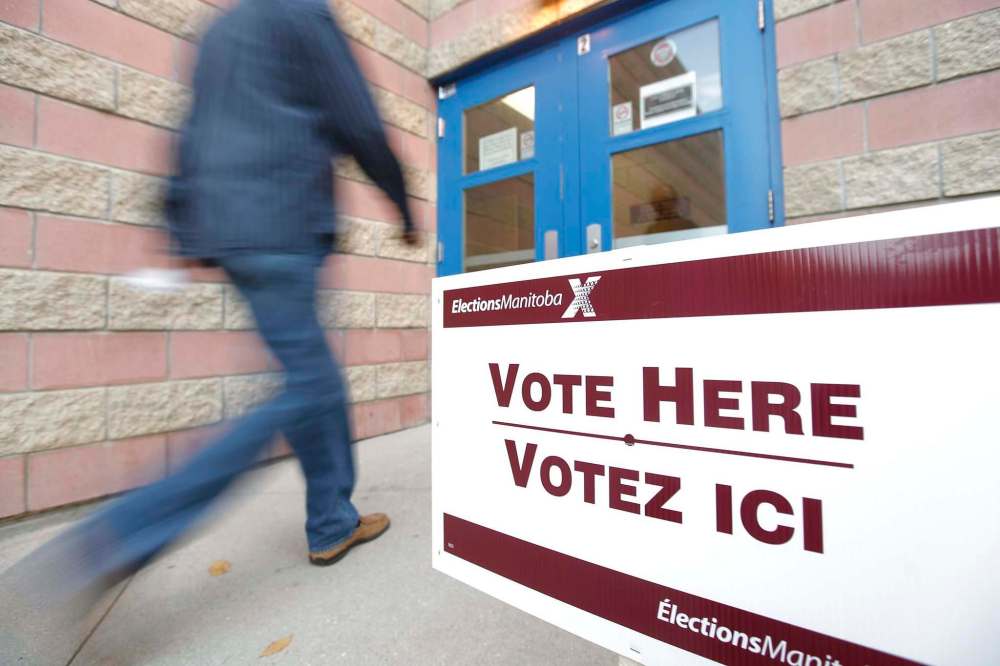Voting an important democratic right
Advertisement
Read this article for free:
or
Already have an account? Log in here »
To continue reading, please subscribe:
Monthly Digital Subscription
$1 per week for 24 weeks*
- Enjoy unlimited reading on winnipegfreepress.com
- Read the E-Edition, our digital replica newspaper
- Access News Break, our award-winning app
- Play interactive puzzles
*Billed as $4.00 plus GST every four weeks. After 24 weeks, price increases to the regular rate of $19.95 plus GST every four weeks. Offer available to new and qualified returning subscribers only. Cancel any time.
Monthly Digital Subscription
$4.99/week*
- Enjoy unlimited reading on winnipegfreepress.com
- Read the E-Edition, our digital replica newspaper
- Access News Break, our award-winning app
- Play interactive puzzles
*Billed as $19.95 plus GST every four weeks. Cancel any time.
To continue reading, please subscribe:
Add Free Press access to your Brandon Sun subscription for only an additional
$1 for the first 4 weeks*
*Your next subscription payment will increase by $1.00 and you will be charged $16.99 plus GST for four weeks. After four weeks, your payment will increase to $23.99 plus GST every four weeks.
Read unlimited articles for free today:
or
Already have an account? Log in here »
Hey there, time traveller!
This article was published 18/04/2016 (3601 days ago), so information in it may no longer be current.
On Tuesday, you’re expected to once again do one of the most important things you can for democracy. You’re expected to vote. While many of us may be suffering from voter fatigue, particularly after last fall’s long federal election, this remains an important responsibility of citizenship: taking the time to educate yourself about the vote and then taking the 10 minutes required to exercise that right.
This year’s provincial election has some historical significance and should serve as a sober reminder of those who fought so hard to win the right to do what many of us now take for granted.
This is the 100th anniversary of the franchise for (some) Manitoba women — the first women to have the right to vote at the provincial level in Canada. The franchise expanded after that, but slowly. It wasn’t until 1960 that First Nations women were given the right to vote. In the last federal election, there were concerns the right to vote would be eroded with proposed changes to the Citizenship Act and limitations on expats’ ability to vote. Those concerns alone should underscore how tenuous citizenship rights can be.

Which is what makes the low voter turnout in Manitoba even more shameful. In 2011, slightly less than 56 per cent of Manitobans turned out to vote. In 2007, it was slightly less than 57 per cent. The record was set in 2003 for low voter turnout at 54.2 per cent when Gary Doer won a second mandate for the NDP over the Conservatives led by Stuart Murray.
While turnout at recent advance polls has been higher than in 2011, many believe the overall number is unlikely to improve.
Saskatchewan’s most recent election (April 4) turnout was also low — a historic low — at 57 per cent. (P.E.I., by the way, has historically had high voter turnout in its elections. In 2011, more than 76 per cent of eligible voters turned out.)
Why people don’t vote is interesting. Many have said they don’t vote because they don’t think it will make a difference. Or they don’t vote because they don’t know who to vote for.
There’s some early research that says ridings with low media saturation have low voter turnout — another reason to ensure local media are healthy. Still others suggest they don’t take the time to vote because, well, they just don’t have the time, or they are sick and incapacitated.
Studies on why people do vote at a provincial level are also interesting.
Turnout is higher in provinces that have two main parties in close competition and where the population is more rural, have a higher proportion of people born in the province and where there is a lower proportion of indigenous voters. As well, according to political scientists Alan Siaroff and Jared Wesley, voter turnout is higher in provinces where “the rate of left-leaning parties and the rate of unionization are higher.”
Perhaps the biggest precursor for high voter turnout is competitiveness and the likelihood for potential change in government.
Look to Alberta as an example. The Conservatives had been in power for 40 years in that province, and it routinely had the lowest voter turnout compared to all other Canadian provinces, dropping as low as 40.6 per cent in the 2008 election. In 2015, when the NDP under Rachel Notley rose to power, the voter turnout was the highest it had been in 22 years: 58.25 per cent.
To vote is to take a stand on your future. Take the stand. Vote.










